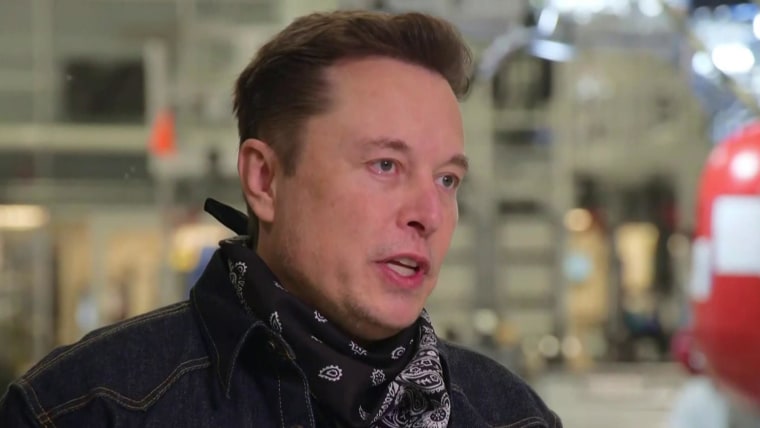Elon Musk is entering the carbon capture market.

Key Highlights
- SpaceX has begun a programme to extract CO2 from the atmosphere and convert it to rocket fuel.
- The initiative will not only help to mitigate climate change on Earth, but it will also help Musk's ambition to establish a settlement on Mars.
- Another method of carbon capture is direct CO2 sequestration from power plants.
- Is Tesla considering constructing an electric tanker truck?Musk is, however, keen on developing both carbon capture from the air and Sabatier technology for his proposed Mars settlement.
- Senator Bernie Sanders (I-VT) has called carbon capture a "false answer."
Advertisement

Elon Musk, CEO of SpaceX and Tesla, who is currently Time magazine's Person of the Year, is frequently accused of ignoring Earth's issues in favour of running his private space programme. The charge is erroneous on a number of levels. Musk, after all, also owns an electric vehicle firm. Now, the space entrepreneur has unveiled a new venture on Twitter that may demonstrate that travelling into space may assist the Earth as well.
SpaceX has begun a programme to extract CO2 from the atmosphere and convert it to rocket fuel. Please consider joining if you are interested, "he tweeted.
Climate change, induced by human activity, specifically the release of greenhouse gases such as carbon dioxide into the atmosphere, is a source of obsession for many in government and the media. Musk's suggestion has intriguing consequences for the issue and the allegations that he wishes to leave Earth for Mars. The initiative will not only help to mitigate climate change on Earth, but it will also help Musk's ambition to establish a settlement on Mars.
The easiest aspect of the idea is creating rocket fuel from CO2. A century-old process created by Paul Sabatier, a Nobel Laureate in chemistry, combines CO2 with hydrogen and a catalyst to produce methane and water. Musk's rocket, which SpaceX is developing in Boca Chica, Texas, is powered by liquid methane and liquid oxygen engines. On the International Space Station (ISS), NASA utilises the Sabatier system to generate water for the crew. The ISS is used to expel the methane.
Musk's plan's first component, pulling CO2 from the atmosphere, is likely to be more difficult. The concept of carbon capture from the air reducing the Earth's greenhouse gas emissions and thereby mitigating climate change is contentious. According to Techcrunch, one such project is being done in Iceland by a startup named Climeworks. Currently, the corporation spends between $600 and $800 per tonne of carbon dioxide removed, a cost that is regarded as excessively exorbitant. Climeworks' goal is to bring the cost down to between $100 and $200 per metric tonne (also called a tonne) in order to make the project economically viable.
Another method of carbon capture is direct CO2 sequestration from power plants. Indeed, NET Power has a pilot plant in La Porte, Texas, just a few hours away from Boca Chica. It burns natural gas but captures and stores CO2. Could Musk obtain the CO2 he requires from the NET plant or another source similar to it? Perhaps, but Musk, being an environmentalist, may baulk at shipping the gas to Boca Chica via a diesel-fueled tanker truck. Is Tesla considering constructing an electric tanker truck?
Musk is, however, keen on developing both carbon capture from the air and Sabatier technology for his proposed Mars settlement. The goal is to extract carbon dioxide from the Martian atmosphere and hydrogen from water ice, and then transform them into rocket fuel for spacecraft returning to Earth from the Red Planet.
Advertisement

Musk has funded a $100 million X-Prize to spur the development of carbon capture technologies, noting that "to win the grand prize, teams must demonstrate a working solution at a scale of at least 1000 tonnes removed per year; model their costs at a scale of 1 million tonnes per year; and demonstrate a path to future scales of gigatonnes per year."
If and when a direct air capture solution is realised, it will be a win-win situation. Human civilization will have one or more technologies that will contribute significantly to resolving the climate catastrophe. Musk will now have a source of CO2 from which to manufacture his own rocket fuel and pursue his grand concept of a Mars civilization, in addition to returning humans to the moon and a variety of other aims.
A rocket powered by liquid methane and liquid oxygen will emit water and CO2. However, a planet equipped with technologies capable of capturing carbon from the atmosphere will almost certainly be more than capable of dealing with the situation.
Senator Bernie Sanders (I-VT) has called carbon capture a "false answer." However, the delightful irony is that while Green New Dealers create schemes to address climate change that include the abolition of the fossil fuels sector, billionaire capitalists such as Musk are developing alternatives that avoid such a terrible economic catastrophe. Musk and others like him have a greater chance of success than politicians and campaigners. Musk has pledged to save the Earth and colonise Mars.
Advertisement